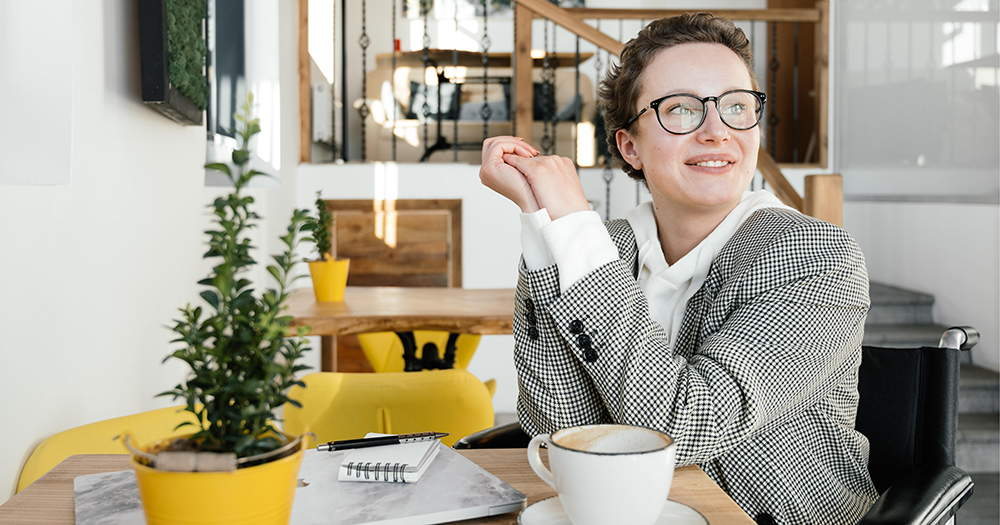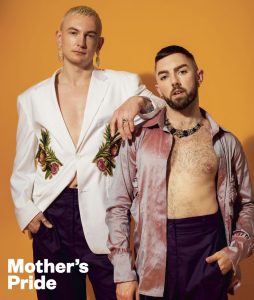As Disability Pride Month continues, our writer speaks with friends on what Disabled Joy means to them.
It’s been a heavy year, but I don’t have to tell anyone that. In fact, it’s been a heavy few years. Disabled People have carried greater weight than most though, and I think there needs to be an acknowledgement of that.
We were the first ones told to shield, yet the first to be left behind because people were ‘over’ the pandemic. It can feel particularly heavy when you feel that you as a community are alone in fighting for yourselves.
Saying all that, people can’t imagine a positive to being Disabled, and there’s a misconception that Disabled People are unhappy. That couldn’t be further from the truth!
What Disabled Joy means to me is seeing my Disabled friends succeed despite a world that does everything to keep us down and pigeonhole us. It means knowing that I always have a community of people that I can rely on to be in my corner. There was a time when I would work myself into the ground because I felt like I had something to prove, but I’ve found joy in looking after myself instead. I find joy in the connections I’ve made with people online, and in quiet mornings in bed resting.
I’ve asked some friends both old and new the same two questions:
- What does Disabled Joy mean to you?
- Where do you find joy?
These were their answers:
Cúán Keane (he/they)
“One of the biggest sources of Disabled Joy for me right now is that I have a new wheelchair. It’s actually made for me, and it’s like it’s a dream. Especially going downhill, I barely even need to touch it, it just flies. I’m hoping to get some power assist put on it soon as well, just to help protect my shoulders. I’m so looking forward to it, like I know it will be unstoppable when that happens. So that’s one source – those kinds of those moments where you get that right adaptation, and you’re like, ‘Oh life is that little bit easier’.
“Another thing that comes to mind for me is defiance. And in certain respects, Disabled Joy to me feels very similar to Queer Joy – I am going to be happy, despite what society tries to put on me, despite the narratives that are out there, despite whatever hardships that might cause me. I deserve to be as happy as anyone else and if I have to make it myself, I will.
“Then the other one for me is community. It’s chatting with other Disabled folks. And in my case, my entire friends circle at this point is other queer folks, mostly Trans queer folks, and just chatting disability with people who have similar life experiences. They get the intersection of it all. Helping friends figure out things, you know, because in my friend group, I’d be the more experienced Disabled person 99 percent of the time. So, a friend would come and be like “My knee has been giving me trouble,” and I’m like “Okay, well, you’re 23, if you haven’t had a big injury, your knee shouldn’t just be giving you trouble over nowhere. Let’s troubleshoot this, like have you got braces,” and things like that.
“Just the reciprocal joy of them finding relief and me knowing that I helped them get there and helped them figure out the next step on their path is great.”
Alber Saborio (they/them)
“When I first think about it, the first thing is: relief. And maybe not necessarily in a sense of relief of pain, but also like the relief of dealing with ableism. I find Disabled Joy in relief from those things, when other people can take care of them for me, or when they’re not present. Like, the first thing is my heating pad – because I have really bad arthritis – which often really helps manage my pain. There are barriers in place like the fact that some (pain) medications are opioids, so they don’t want to give them to you, in case you’re a drug user. Even if I was a drug user, I should still be allowed to have pain medication.
“Also, the little things like when I have like a day where I have more energy, and I get to do something nice for myself, like, I don’t know, buy myself flowers or go to the beach.
“So yes, the first thing that I think of is my heating pad because it gives me so much physical relief, but also it’s just a nice feeling. I also use ice as a relief from pain and it is joyful, but it’s not as joyful as heat because Ireland’s really cold. I also find a lot of Disabled Joy in meeting other Disabled People and forming community with them and getting to, like, complain about our aches together.”
Aine O Hara (they/them)
“I think for me, it’s a sense of belonging. That comfortable intimacy that you have with other Disabled People where you don’t necessarily have to go into details, being treated like a human; that kind of thing is often really magical. Those kinds of spaces are really exciting and give me so much joy. They can also be tiny things like you with just one pal at home.
“I think that care is also really tied into joy in my head. I was thinking about other Disabled People bringing me things when I’m struggling or finding a way to meet my access needs when I’m not able to advocate for myself or verbalise anything. Looking after each other and hanging out without trying to fix each other.
“I really love things like makeup and clothes, and experimenting with those kinds of things gives me so much joy. Also, so much dancing. Over the past few years refiguring out what dancing is to me and not putting outside structures on myself. Yeah, I think that’s it – hanging out with other Disabled People. It just gives me so much joy that I can’t even describe.”
Freddie Le Brun (they/them)
“Disabled Joy, for me, means finding the best in every day. Because I can’t guarantee what that day is gonna look like. I could have had a really good night’s sleep, I could have had a really bad night. So my joy could be actually getting out for the day. Or it could be just having enough energy to play with my rats. I have three little terrors. And one of them’s on medication, which is not easy. But just having that comfort of having them there.
“My rats, art, I draw, I write, knit. I paint (trying to get my flat done at the moment), and also the time I spend with my friends and family. And sci-fi conventions!”
Laura Beston (they/them)
“Disabled Joy has meant different things to me at different points in my life. I think ultimately it’s about being seen, being represented and feeling comfortable. I think as well there are layers. The beginning is feeling comfortable, like acceptance within society, which I think leads to everyone feeling comfortable. So there’s less judgement. That’s joyful.
“I think for me, it’s when I can be completely myself around people. A lot of Disabled People have this experience of maybe having to alter themselves in different spaces in different environments. For me, it’s seeing us move into this state, this phase, where we are having our own culture but it very much can become this really beautiful space when queer culture and Disabled culture come together. You know, there’s been some really nice times and spaces where that’s happened and that’s where I find joy.”
Disabled Joy is everywhere, and there’s no one definition of it. It’s a very personal, vulnerable thing to talk about so I just want to take a second to thank all of my wonderful contributors for their willingness to discuss theirs.
Oftentimes, stories like these are written as a feel-good piece for non-Disabled people. They will centre on how Disabled People make them feel. This isn’t that; this is a celebration by and for Disabled People, particularly Disabled Queer People who are often further marginalised by inaccessibility.
Loving yourself in an often unkind world that lacks inclusivity is truly the most joyous thing you can do; there’s a whole community ready to welcome you.
This article originally appeared in GCN Issue 372, which you can read online here.
© 2022 GCN (Gay Community News). All rights reserved.
This article was published in the print edition Issue No. 372 (June 10, 2022). Click here to read it now.
Support GCN
GCN is a free, vital resource for Ireland’s LGBTQ+ community since 1988.
GCN is a trading name of National LGBT Federation CLG, a registered charity - Charity Number: 20034580.
GCN relies on the generous support of the community and allies to sustain the crucial work that we do. Producing GCN is costly, and, in an industry which has been hugely impacted by rising costs, we need your support to help sustain and grow this vital resource.
Supporting GCN for as little as €1.99 per month will help us continue our work as Ireland’s free, independent LGBTQ+ media.

